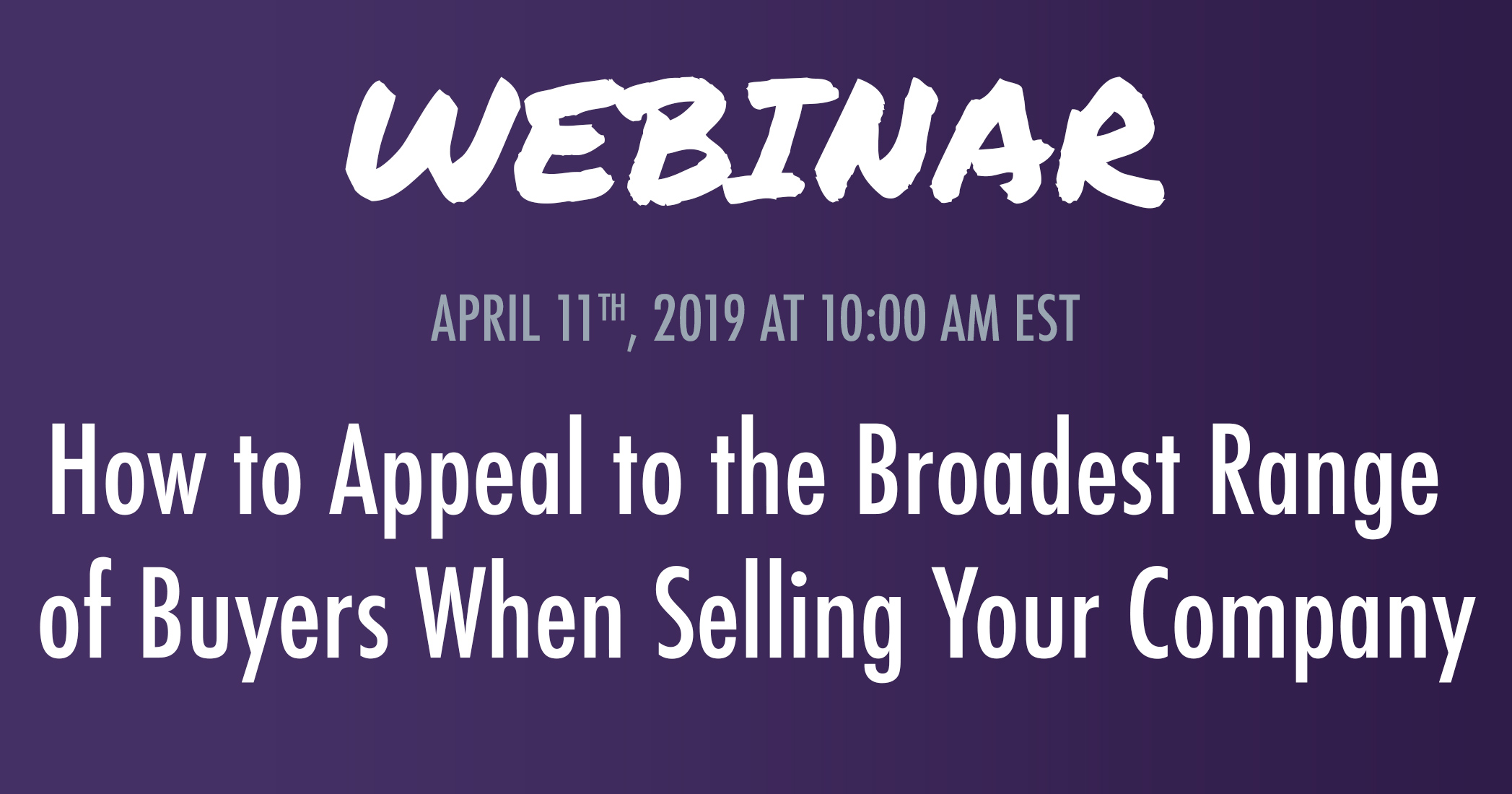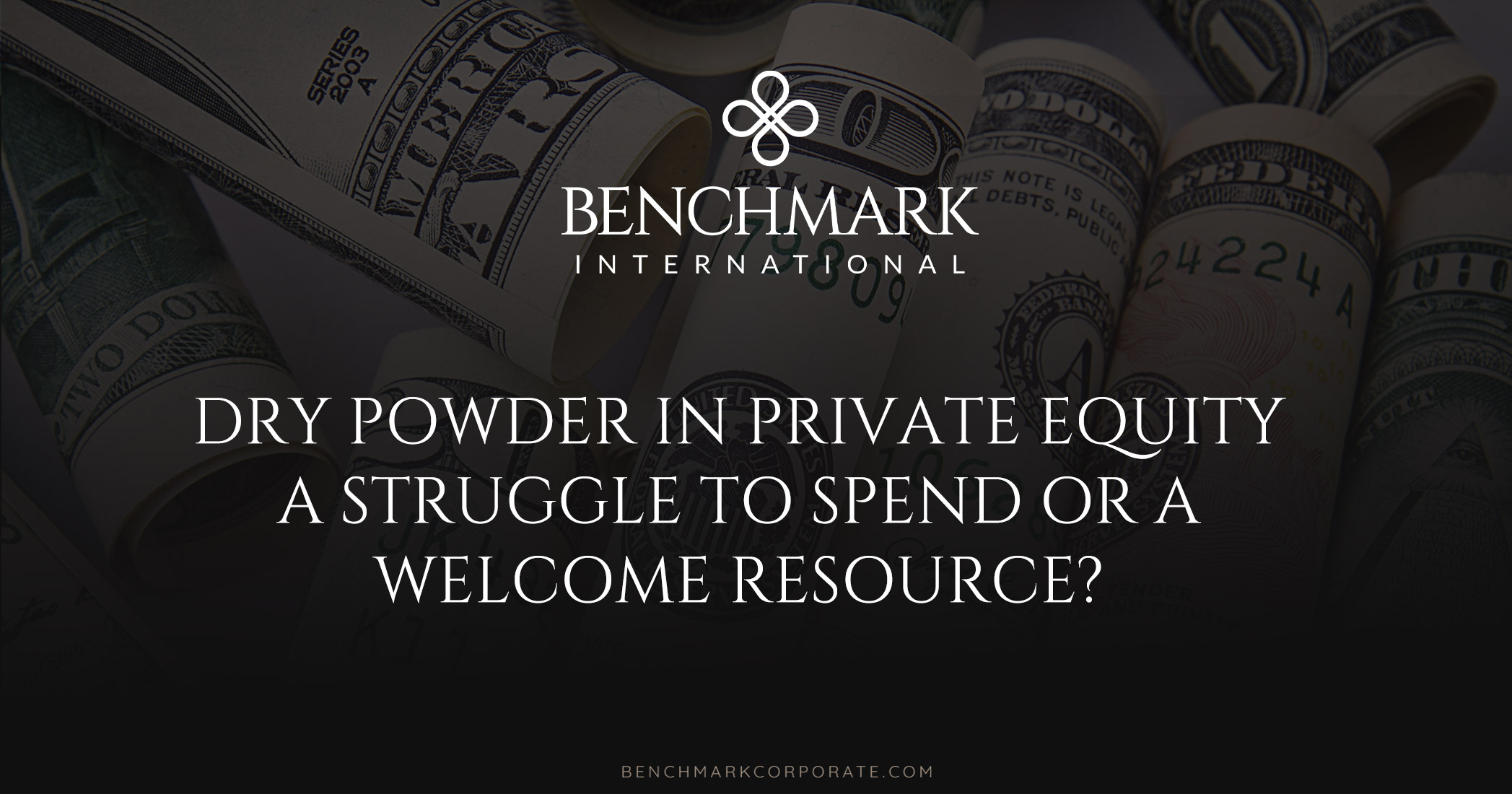Deal fatigue is a condition that can arise during negotiations where involved parties begin to feel exhausted, discouraged, and frustrated in their attempt to reach an agreement. The negotiation process can sometimes be lengthy and demanding and requires players to spend valuable resources such as time, money, and energy. The inability to compromise in such negotiations not only depletes these resources but also can ultimately lead to a potential deal falling apart. Deal fatigue is a common obstacle in the world of mergers and acquisitions, one that both buyers and sellers alike have faced. From this, however, dealmakers around the globe have observed a few preventive measures that can be taken to ensure a successful transaction.
READ MORE >>Archives
Deal Fatigue: Preventative Measures
6 Indicators that it Might be Time to Sell Your Business
You may not have considered selling your business and moving onto the next project, as perhaps it is growing at an acceptable pace and you have no pressing reasons to sell. Nevertheless, it may be worth considering an exit if you can identify with any of the following:
Your Business is Making you Exhausted
There are a number of reasons why your business could be making you exhausted. Perhaps you only started it for the money and you don’t love what you do, or the lifestyle of an entrepreneur hasn’t met your expectations. Whichever way, you feel apathetic towards the business and dealing with it is tiring.
While you have no need to sell, if you feel burnt out by your business it is worth considering doing so – you are doing the business no favours by sticking it out as the business could suffer as a result of not having someone at the helm who wants to drive the business forward.
Business Growth
If your business is steadily growing, then it may be a good time to consider an exit. A buyer is likely to pay over the odds for your company if it is on a growth curve as they can reap the rewards later down the line.
Equally as attractive to a buyer is a business operating within a growth industry. Even if your business is not seeing the growth, if the industry you operate in is thriving, a buyer could be interested due to the opportunities available.
You’ve Received an Offer You Can’t Refuse
A buyer has approached you and offered to buy your business for a handsome sum of money. You weren’t thinking of selling but, as you might not receive an offer like this again, this is perhaps a good indicator that you should sell.
Nevertheless, it’s always beneficial to take your business to market even in the event of such an offer, because if one party is willing to offer this for your company, then there’s no reason why others wouldn’t value your business the same, or maybe even higher.
You Want to Take Advantage of Low Capital Gain Tax
Capital gains tax is at historically low levels; therefore, it is a good time to sell. While this is not the only reason you should sell, if you feel yourself identifying with other reasons on this list, then now may be a good time to take advantage of this.
You’ve Been Offered a Better Job Opportunity
This might seem strange – you are your own boss and now you are going to be an employee. However, there are many merits to being an employee – for example, a regular, and probably better, income and being free from the demands and liabilities involved in running your own business.
You Don’t Have the Correct Skills to Grow the Business
As a business grows, more and different skills are required to keep the business growing than when you initially started. For example, you might be a great salesperson, which was extremely beneficial when setting up the company but, now, leadership is required in different areas. You could possibly learn these skills, or employ more people to take on these new leadership roles, but if you feel like you don’t have the energy to carry on with the business, this may be another indicator that it’s time to move on.
While the above points may be a good indication that it’s time to move on, it’s unlikely that one of these alone will compel you to sell. Instead, you might decide to sell because of a mix of these reasons, coupled with other factors such as economic conditions. When this time does come, Benchmark International can help by discussing your exit strategy and assisting you in finding the best buyer for your needs.
READ MORE >>Share this:
Webinar: How to Appeal to the Broadest Range of Buyers when Selling Your Company
When selling your business, dealing with the various types of buyers present in today’s market is both a curse and a blessing. It’s a blessing in that, aspects of your business that may not appeal to a certain buyer type may appeal to, or at least not be an issue with, other types of buyers. But a hundred different curses almost offset this large benefit. What do different buyers prioritize? How do you appeal to two or more different types of buyers at the same time? How do different buyer types run their decision-making processes? Which buyer types should you pursue? How do you even know what type of buyer you are dealing with?
In a world with only one type of buyer, the company sale process is greatly simplified. They might all like to hear the company’s story the same way. They might look at the financial statements the same way. They might all operate on the same timeline with the same seasonal variations. And, they might even be susceptible to being found in the same place from time to time. But, what is currently driving the robustness of today’s M&A markets are in fact the imbalance between the number of buyers and the number of sellers in the arena. And this, in turn, is largely driven by the increasing diversity of buyer types now competing with one another for that limited supply of opportunities.
In today’s market, one of the worst moves a seller can make is to market to only one type of buyer or, even worse, run a process expressly excluding one or more types of buyers. The success of any current sale process relies on a much more sophisticated approach to marketing, than was the case a decade ago - one that catches the interest of all buyer groups simultaneously and excites them for the opportunity to investigate further. The first step in exploiting this development is to identify the strengths, weaknesses, and priorities of the various buyer types. This webinar will start with this analysis and then move quickly onto strategies for playing to various buyer characteristics.
Host:
Clinton Johnston
Managing Director
Benchmark International
Share this:
Five Reasons Why It’s Worth Investing in an M&A Adviser When Selling Your Business
You have come to a point in your business life where you have decided that it is time to sell and move onto the next project. Of course, you want to command the best price for your business and explore all the opportunities available. As such, you have considered an M&A adviser to help in the process – but is it really worth it? They could help you generate more value for your business but if you factor in the fee for engaging their services, will you make any more money?
Then again, there are many advantages to hiring an M&A adviser, which are not just limited to value. If you have thought about hiring an M&A adviser, but are unsure of the benefits, consider the below:
They can Minimise Distractions During the Process
You know your business the best and if you are knowledgeable about the M&A process you could facilitate the transaction yourself – although this doesn’t mean you should. After all, an M&A transaction takes a significant amount of time and the time you have to spend on the transaction could end up being detrimental to business performance. As the value of a business is more often than not linked to financial performance, you need to focus your efforts into making sure the company is performing the best it can be, rather than focusing on the transaction itself.
They can Source a Larger Pool of Buyers
If you’re thinking of selling your business you may have an idea of the acquirers you want to approach. This is good, but an M&A adviser constantly networks with various strategic and financial buyers on a national and international basis in various industries; therefore, they have a very large pool of acquirers at their fingertips to contact about the opportunity. Not only is an M&A adviser’s pool of acquirers large, it is also varied, which means they can think outside the box and a lucrative deal could be sourced cross-sector. Another benefit of generating interest from a large pool of acquirers is you are more likely to have multiple competing bids, strengthening your negotiating stance.
They can Negotiate a Favourable Deal
As mentioned, an M&A adviser can help to create a competitive bidding environment which can lead to a better deal being negotiated; however, this is not the only way an M&A adviser negotiates on your behalf. Often, deals are not for 100% cash so an M&A adviser will negotiate a deal structure so both parties can reach a compromise and agreement. This can be very beneficial for you if, for example, you have just secured a large contract where earnings will increase over the next year, as, if the deal has been based on a multiple of current earnings, then you will not be correctly compensated for the contract you have secured. Therefore, an M&A adviser will negotiate a deal which will maximise value beyond the purchase price.
They can Protect your Interests
It is in your best interest to keep the sale of your company confidential – if it gets out that you are selling this could potentially alienate employees and customers and give your competition the upper hand. By yourself, when approaching potential acquirers, it is difficult to protect the identity of the company as it’s not easy to solicit interest without disclosing who you are. An M&A adviser, on the other hand, will have interested parties sign a non-disclosure agreement before they are given any information about the business, including the name of the business and the owner. At this stage, it is also important to gauge whether the company you are approaching has the finances to purchase your company – again, this is something which is difficult to do without compromising confidentiality.
They Add Valuable Resource
They say ‘first impressions are the most lasting’ so when it comes to selling your business, it is important that a potential acquirer’s first impression is first rate. An M&A adviser can assist with this through their proven processes that help businesses to market themselves as the complete package. As well, engaging an M&A adviser can add credibility to potential buyers as they can see that you are serious about conducting a transaction, which can save time and improve offers.
READ MORE >>
Share this:
Preparing for Due Diligence: Sell-Side
Due diligence is a buyer’s detailed investigation into the matters of your company in preparation for a possible sale transaction. For many business owners, this is one of the most dreaded parts of selling their business. After a letter of intent (LOI) is signed and a price range is agreed to, buyers have the right to dig into the business to ensure that they know what they are buying, and to identify any potential risks of owning the business. While buyers and sellers have different objectives and motives, both parties benefit from a thorough and efficient processes. Whether your company is pursuing a capital infusion or positioning itself for an acquisition by a strategic or financial buyer, due diligence is a critical component of every investment. It’s an intrusive process and, like everything else about the sale of your business, you need to be prepared.
When a potential buyer assesses your company, they will want to fully understand the essentials of the business such as organizational information, financial records, regulatory matters and litigation, employment and labor matters, and many others. When your company is well-prepared for the exit process, long before it is anticipated, not only will it make the company look more attractive to potential buyers but it will also maximize the value and expedite the transaction timeline. If not properly prepared, this can result in an incredible demand on a company and its resources, give a buyer the perception that the company is disorganized, and create operational difficulties within the company.
Below are four ways to prepare for due diligence and secure the deal you want:
Start with a Due Diligence Checklist
Most buyers will provide the target company with a due diligence checklist but, before receiving that list, sellers should ensure that common checklist items are available, up-to-date, accurate, and organized. The data needed for the due diligence process should be in order and ready to be uploaded to a virtual data room within a couple of days of initiating due diligence. This is not only necessary in the event of an acquisition, but it is also a valuable discipline to maintain as the company grows.
Invest in Professional Accounting Practices
The due diligence process is dependent upon the strength of the seller’s accounting system. It is essential that the company’s financial reports present potential buyers with a clear story, allowing them to fully evaluate the company’s earning potential. Buyers will be concerned with all of the target company’s historical financial statements and related financial metrics, as well as the reasonableness of the projections of its future performance. A business’ financial records should be clearly stated and easy to follow. If not, this could create confusion, misunderstanding, and devaluation.
Planned transactions have failed, even though the business itself was healthy and growing, when the financial reporting was outdated, inaccurate, or incomplete, and the buyer could not trust the data. Accurate financial statements are also necessary for the seller to support the business valuation. What assets does the business have? How profitable is the business? What is the working capital? What are the growth trends? All of these are major factors in the valuation of the business, so the data representing them needs to be accurate and precise.
To avoid issues, it is recommended that, before going to market, a seller contacts an independent accounting firm to review or audit the company’s financial statements. This will help to ensure that the company financial data is accurate and complete, will instill a sense of confidence from the buyer, and will more likely result in an efficient and successful due diligence process.
Engage Qualified Representation
A team of good professional advisors is crucial to a successful sale of a company. These advisors will steer sellers in terms of what they need to do to get their company ready for sale. Tap into these resources because they will have dealt with enough transactions to know what you should be focusing on to ensure a successful sale. Some recommended professional advisors include, but are not limited to, a M&A broker, an accountant, a tax advisor, a M&A lawyer, a wealth advisor, an investment banker, and a trusts and estate lawyer, if needed. With advance planning and the help of good advisors, a seller can ensure that his or her best interests are fully represented, common pitfalls are avoided, and the transaction will run smoothly and efficiently.
Responsiveness to Requests
During the due diligence process, potential buyers will seek to comprehensively understand the business practices behind a company’s earnings. It is the sellers job to guide the buyer through the learning curve. Respond to the buyer’s due diligence requests in an organized, detailed, and complete manner. If there are requests for missing data, respond punctually. This responsiveness allows the seller to gain credibility with a buyer, and provides buyers additional comfort with the quality of the business they are buying.
Conclusion
Due diligence is a vital and complex part of M&A transactions. Preparing beforehand can help a company position itself for higher valuations, stronger negotiations, and better outcomes. Understanding the importance of due diligence to both parties in a transaction, planning in advance, enlisting the support of specialists, and investing the time to run a thorough due diligence review early in a transaction will help prevent unwelcome surprises and potential liabilities for both parties.
Author
Kayla Sullivan
Associate
Benchmark International
T: +1 813 898 2350
E: Sullivan@benchmarkcorporate.com
Share this:
What to Do When You’ve Lost the Entrepreneurial Spirit
When you first started your own business, you were probably brimming with entrepreneurial spirit, otherwise the company would never have got off the ground in the first place. Now, however, you are feeling lacklustre towards your business, as the mundane tasks to keep the business going are taking over and hampering your entrepreneurial spirit. Here are four steps to take action and get your business moving forward again:
Delegate Tasks
As your business grows you might find yourself doing increasingly more menial tasks to keep the business going. To ensure you have time to focus on the business, these tasks need to be delegated. Granted, this is easier said than done as you might want to stay in control rather than train somebody else to do them; however, if you continue to do this you are working in the business rather than on it. To ensure that you are the visionary and troubleshooter that you need to be, delegate work – you’ll be able to work on the bigger picture and your employees will appreciate the trust and responsibility you give to them.
Work on Goals for the Year Ahead
If you have got to a point where you have grown from a start-up then it might seem like the largest hurdle has been overcome. Nevertheless, you need to keep this momentum going to watch the company flourish. To do this, it’s a good idea to have plans and goals for the upcoming year, setting aside time to break down your goals into smaller steps with these to be actioned monthly, or even weekly. If these tasks are scheduled, and you ensure they are actioned, then this helps to make sure these goals are accomplished.
Encourage Innovation
If the day-to-day has become monotonous and the business is plateauing then you might want to encourage innovation to take the business in a new direction. To innovate it is useful to listen to both your customers and employees, as well as encourage your employees to take risks and think outside the box. This way, new ideas can be created and prevent the business from stagnating.
Take Some Time Out of the Business
Taking some time out of the business can help you to recharge. Whether this be scheduling time for yourself each evening, making sure you take time off at the weekend, or going on holiday, taking time out can help you to take a step away from the business and refresh, helping to stimulate fresh ideas.
READ MORE >>
Share this:
How to Avoid Leaving Money on the Table When Selling a Business
The sale of a privately-owned business is often the most significant financial event in the life of the owner. It marks the culmination of years of hard work and converts paper wealth into real wealth. It is a one-time opportunity with no do-overs. Every business owner surely desires the best economic outcome, yet, time and time again, business owners leave money on the table by not adequately preparing for the sale of their company. This article suggests five actions that private business owners can take to avoid leaving money on the table when selling their business.
READ MORE >>Share this:
How Do I Make Sure my Business is Left in Good Hands When I Sell?
Find the right partner.
Partnering with the best team of experts to help you sell your business is the most important thing you can do when seeking a buyer you can trust. Not making the right choice can cost you time and money. Because you want to sell at the best time, you don’t want to waste time talking to the wrong people. By working with an experienced and globally renowned mergers and acquisitions team such as Benchmark International, you can mitigate the risk of letting an under-qualified broker deal with the sale of your company. You’ll want to make sure the firm you choose has highly specialized experts in your area of industry and the kind of global connections that can find the best buyer for your business.
Stay involved in the process.
Even if you work with an experienced firm to facilitate the sale, you want your relationship to be a partnership. They are going to work hard for you, but you know your business better than anybody. Finding a team that wants you to remain engaged in the process will result in a sale you can feel good about. By staying involved, you are also giving prospective buyers added confidence in their purchase.
Know your magic number.
It is crucial that you have an idea of your company value before putting your business on the market. Any reliable buyer will expect to be given accurate financials about your business. It is recommended that you seek the help of an organization that has the expertise in achieving maximum values for businesses. They will help you assess the value, fix weaknesses, boost strengths, and form your ideal business exit strategy for maximum success.
Be honest.
Represent your company accurately when dealing with prospective buyers. Inflating numbers or trying to cover up issues can result in a failed deal when the actual financials come under review. If you want to trust the buyer with your business, you should expect that they would want to trust you, as well.
Be prepared.
Being adequately prepared is also an important step in selling to the right buyer. Make sure you have all the documentation in order regarding finances, profitability, real estate, and staffing. Make sure inventory is fulfilled, records are current, and taxes are paid. Being prepared can affect the price your business will command in the marketplace, as well as the level of interest from quality buyers.
Think ahead.
Do not get so focused on the sale of your business that you are not thinking about the transition period. An experienced partner can help you keep your focus in the right place and ensure that you and the buyer are on the same page, and both are properly prepared for the transition.
There is plenty to consider when taking on the daunting task of selling a business. Keep in mind that while you are an expert in your particular business, arranging its sale may be beyond your range of expertise. Relying on a knowledgeable team such as your partners at Benchmark International can ensure that you get the value you deserve and sell to a buyer you can trust.
READ MORE >>Share this:
How to Deal with State Income Tax when Calculating EBITDA
As we all know, EBITDA is not defined under either accounting’s Generally Accepted Accounting Principles (GAAP) or International Financial Reporting Standards (IFRS). What’s worse is that there is no other evenly mildly authoritative source that delves into the specifics of the definition beyond much more than a one-word description of each letter’s meaning.
Despite its murky definition, EBITDA remains the lengua franca between buyers and sellers when discussing valuation of privately held companies. Regardless of the true manner in which the seller sets the minimum price for which she will part with her business and whichever of the likely more academic methods the buyer has used to determine its maximum purchase price, the parties tend to lob multiples of EBITDA back and forth across the negotiating table.
While the exact meaning of each letter in the acronym is worthy of its own discussion, there is perhaps no more frustrating issue than how to deal with state income tax in the “T” portion of the term. The frustration arises because some parties refuse to acknowledge that what is so eminently clear - that state income taxes should be treated in an identical manner to the treatment of federal income taxes.
The very purpose of using EBITDA in these discussions is to place the concerned enterprise in neutral position with regard to capital structure, accounting decisions, and tax environments. This is why, and all parties do agree on this point, federal income taxes would always be added back to earnings when making this calculation. The proponents of not adding back state income tax are never able to explain why differing treatments would result in better serving the objective of using EBITDA.
State income taxes, like federal income taxes, are only due when a business is profitable. A business’s profitability is effected by, among other things, its capital structure (because more debt means more interest and interest reduces income and is therefore a tax shield whereas dividends do not and are not) and its depreciation (because, again, depreciation reduces earnings and serves as a tax shield). These factors have the same effect on state income taxes as they do federal income taxes. Thus, the amount of federal and state income tax a business pays in a given year will vary depending on the quantity and rate of loans outstanding that year and the method and amount of depreciation employed (i.e., the entity’s capital structure and accounting decisions). The amount of state income tax paid in a given measurement period is no more or less a function of the business’s operations than is its federal tax paid over that same period.
Further, while also not defined under GAAP, “profit before tax” (PBT) is a term more commonly used by accountants than EBITDA, appearing on a fair number, if not the majority, of companies’ routine income statements. As accountants will always take this measurement before including the expense of both federal and state income taxes, why should the same logic not apply to EBITDA? EBITDA is, of course, simply PBT minus interest, depreciation and amortization charges.
Proponents of disparate treatment suggest that the state income tax is an unavoidable cost of doing business. But this argument fails for two reasons. First of all, it is not unavoidable. As discussed above, high debt levels and aggressive depreciation can allow the minimization or avoidance of state income tax (just as they can for federal income tax). But more significantly, it is not the job of EBITDA to take out only the “avoidable cost of doing business.” Eliminating 401k matching, reducing salaries, renegotiating a better lease, or relocating to smaller premises may also be ways to reduce the cost of doing business. Yet no one proposes adding benefits, salaries, and rent to EBITDA because they are wholly or partially “avoidable”.
Continuing with this logic, state income taxes are avoidable by changing domicile just as federal income taxes are avoidable by changing domicile. Ask Tyco, Fruit of the Loom, Sara Lee, Seagate or any of the other 43 formerly US companies that the Congressional Research Service identified as redomiciled for this purpose in the decade leading up to the 2014 election. Would the EBITDA of any of these companies not have included an addback for federal income tax because it was an “avoidable cost of doing business”?
Ah, state income tax, the poor runt of the litter in the world of finance. Too small to be taken seriously, too complicated to be understood, and too varied to warrant the time. Five states have no such tax on corporate entities. Most of the other 45 do not impose it on entities making federal S-elections. Those who do impose it do so in many different ways. And the names are so confusing, often being called by another name that allows the state’s development board to claim they do not have a state corporate income tax. Capped at 6% or less in most states, it pales in comparison to the 35% federal rate. (Though Iowa hits double digits at 12%, it is the only state to do so and there exists no documented record of anyone ever buying a business in Iowa.) How unfortunate that this scrawny beast seems to raise its head so uncannily when a deal is on the line, in those final days when the parties are so close yet so far away on valuation and the closing hinges on the fate of this oft-misunderstood adjustment to earnings.
READ MORE >>Share this:
Top Mistakes to Avoid When Selling
So you’ve made the big decision – you’re going to sell your business. This is likely a stressful time for you as have probably spent a lot of time and resource building up the company and may be nervous about seeing it pass over to new hands. So, from here on in, you would like to minimise the amount of stress involved by avoiding any mistakes which can easily be averted. The following are common mistakes to avoid and how Benchmark International can help:
Only Pursuing the Largest Acquirer
Surely pursuing the largest acquirer is in your best interests as they will be able to afford a premium for the company?
While they may be able to pay a premium for the company, they may not necessarily do so. An acquirer is likely to pay a premium for your company because there are synergies in place such as similar markets, products or customers that could be combined, but a large acquirer typically does not need to make the acquisition to enter these markets. An acquisitive party could also benefit from economies of scale and, therefore, will pay more for the target, but a large acquirer is unlikely to benefit from this. Even if a large acquirer is willing to pay a premium, they may absorb operations into their own company, which can cause complications for the handover, particularly if you are loyal to existing staff.
How Benchmark International Can Help: Look at all aspects of the deal and how it can benefit your company. Benchmark International can assist with sourcing the best fit for your company.
Not Looking at the Bigger Picture
You’ve just received an offer from a potential acquirer – on the surface of it, it looks good, surpassing your expectations. However, the structure of the deal as a whole needs to be considered, not just the total value. For example, the consideration could be deferred, or contingent on future earnings, meaning you are not receiving all cash upon completion. It is also important that if you do decide on a structured deal, that these elements are protected, ensuring you receive the consideration.
How Benchmark International Can Help: Benchmark International will thoroughly analyse all offers received, negotiate earn-out protections and can assess any contingent targets to ensure that the seller is able to maximise the consideration received.
Not Creating Competitive Tension
It can certainly be a benefit to enter into the M&A process with potential acquirers in mind, perhaps one of these has even approached you at some point. However, even though it may be tempting to dive straight into a deal with an acquirer that wants you and complements your company perfectly, it is still vital to create competitive tension by generating interest from other potential acquirers. If the acquirer in mind can sense that they are the only one with an offer on the table and that you are anxious to sell to them, they could take advantage of this with a low offer.
How Benchmark International Can Help: Benchmark International will employ an approach where all potential acquirers are approached and exhausted before accepting any offers.
Using an M&A Sector Specialist
This may seem like an odd ‘mistake’ to make – why wouldn’t you want to use an M&A specialist operating specifically in your sector, surely you don’t want a generalist?
The reasoning behind this is that a general M&A firm will be able to think outside the box and target a large pool of acquirers, not limiting itself to those just in your sector.
How Benchmark International Can Help: Benchmark International has a vast and growing number of contacts giving you the best chances of receiving multiple offers, as well as significant experience across a broad number of sectors, leveraging this to identify the areas where the greatest synergies can be exploited.
Leaving it Too Long
To obtain the best price and right fit for your company, it is crucial to enter the market at the right time. It is important to strike a balance between seeking to sell when the company is on a growth curve, but also not missing the window of opportunity in the market cycle. Equally, it is important not to sell when you become desperate (e.g. you are looking at retiring soon) as acquirers could become aware of this and lower their offer accordingly.
How Benchmark International Can Help: Look at selling earlier than anticipated, not when you want an imminent exit. Benchmark International can best advise on when the right time is
to sell.
Neglecting the Day-to-Day Running of the Business
M&A transactions can be time consuming, but it is important not to let it get in the way of running the business. If an acquirer is interested in the business because profits are increasing, or a new product is due to be released to the market, for example, and this does not come into fruition because you have taken your eye off the ball, then this could lead a buyer to renegotiate, or call the whole deal off.
How Benchmark International Can Help: The pressure of selling your business can be alleviated by Benchmark International as it will handle negotiations, leaving you to focus on running your company.
Not Negotiating Effectively at Critical Stages
Offers may go back and forth between yourself and the potential acquirer and at this point you are in a good position to negotiate. It is not until the Letter of Intent (LoI) is signed that the advantage swings to the buyer. Although the LoI is not typically legally binding it does usually stipulate a period where the seller cannot pursue further leads in the market (an exclusivity period), so competitive tension is lost. It is important, therefore, that you are completely happy with the terms (which can include such things as price, length of the exclusivity period etc.) before the LoI is signed to avoid either having to back out of a deal that could have been lucrative or being tied to a lengthy exclusivity period.
How Benchmark International Can Help: In all stages of negotiating, Benchmark International will do this on your behalf with your best interests in mind.
Author:
Lee Ritchie
Senior Director
Benchmark International
T: +44 (0) 1865 410 050
E: Ritchie@benchmarkcorporate.com
READ MORE >>
Share this:
When Is The Right Time To Retire And Sell My Business?
Over 88% of business owners think their business will stay in the family. In fact, only about 30% of family-owned businesses survive into the second generation, 12% are still viable into the third generation, and only about 3% of all family businesses operate into the fourth generation or beyond. As baby boomers are heading for retirement, who is going to take over the businesses the boomers are looking to sell?
Today’s business owners are faced with multiple factors when deciding the right time to sell. The perfect time can be tricky to predict as several economic considerations need to be weighed. The majority of business owners begin this thought process when nearing retirement age, but is this too late? The most important considerations are current economic statistics, market conditions, and industry trends. These are good predictors of a sellers’ market and shows the types of buyers and private equity companies ready to invest. Buyers are looking for businesses in the growth and maturity stages of their business life cycles. During these stages, operational bottlenecks are becoming managed and demand, profits and lasting customer relationships have been built. Business owners sometimes have the tendency to postpone selling until operations and profits begin to decline. This is a costly mistake for any business owner wanting to maximize their company’s value.
Sellers should strive to put aside personal feelings anchoring their decision-making process when considering their exit strategy. When considering selling, business owners should focus their attention on asking is my business in a financial incline, is my staff in place able to succeed without me, do I have a diversified client structure, and are my capital expenditures under control?Business owners need to consider these objectives now and determine if a sale is the right decision. Economic environments quickly change and in order to achieve a premium sales price, a favorable market is the key. Currently, multiples are at a historic high with limited quality businesses available for sale. Baby boomers are holding on to their businesses and aren’t willing to sell until they have to.
This can be a hard-personal decision to make for owners who have built their companies from infancy. Owners are conflicted with their decision, asking did I do the right thing, did I maximize my company’s value, will my employees be taken care of, and what is next in my life.Before considering the sale of your business, define both the internal and external factors and remove any hidden traps that cloud your decision-making process and can result in missed opportunities. By having a written exit plan, an experienced team of advisors, and patience, business owners will realize the full value of their life’s work.
Here at Benchmark International, we understand the emotional and physical stress that accompanies the decision to sell. Our experienced advisors assist by providing an outside perspective to business owners and by identifying suitable conditions in the M&A sector. Our responsibility is to ensure our clients are presented with all the facts and strategies to move forward. Benchmark International values close relationships and ensures that our clients are fully prepared to make the right decision when the day comes.
Author:
Kendall Stafford
Managing Partner
Benchmark International
E: Stafford@benchmarkcorporate.com
READ MORE >>
Share this:
Webinar: Life After the Business Sale: How to Stay Wealthy
November 6th, 2018 at 10:00-11:00 am EST
In this webinar, we will be tackling the really fun topic, the one that is really in every seller’s mind - what to do with all that money you get from the sale of your business. Our Benchmark International host, Clinton Johnston, will be joined by BNY Mellon Wealth Management’s Christopher Swink, a specialist in assisting business owners with their transition into passive investing as part of the sale of their business. Most business owners have grown their personal wealth primarily or exclusively from re-investing their income into their business. In this way, their money has made money for them. Once the business is sold, former owners must come to learn new ways of having their money make money for them. Some of the specific topics we will discuss include:
- What returns can a former business owner expect to earn on their cash?
- How can a wealth manager help me either before I decide to sell or while selling?
- How important is timing my sale to my overall standard of living after the sale?
- Is getting some of my cash from the deal later as opposed to at closing really a bad thing?
- What will my life look like after the sale?
- How can I draw a safe but sufficient income off of my sale proceeds?
Hosts:
Clinton Johnston
Managing Director
Benchmark International
Christopher Swink
Senior Director
BNY Mellon Wealth Management
Share this:
Why Do Buyers Take the Mergers and Acquisitions Route?
A merger is very similar to a marriage and, like every long-term relationship, it is imperative that mergers happen for the right reasons. Like many things in life, there is no secret recipe for a successful transaction. While the strategy behind most mergers is very important to obtain the maximum value for a business, finding the right reason to execute a merger could determine the success post-acquisition.
When two companies hold a strong position in their respective areas, a merger targeted to enhance their position in the market, or capture a larger market share, makes perfect sense. One of the most common goals for transactions is to achieve or enhance value; however, buyers have different reasons for considering an acquisition and each entity looks at a new opportunity differently. The following points summarize some of the primary reasons that entities choose the mergers and acquisition route.
- Increased capacity
When entertaining an acquisition opportunity, buyers tend to focus on the increased capacity the target business will provide when combined with the acquiring company. For example, a company in the manufacturing space could be interested in acquiring a business to leverage the expensive manufacturing operations. Another great example are companies wanting to procure a unique technology platform instead of building it on their own.
- Competitive Edge
Business owners are constantly looking to remain competitive. Many have realized that, without adequate strategies in place, their companies cannot survive the ever-changing innovations in the market. Therefore, business owners are taking the merger route to expand their footprints and capabilities. For example, a buyer can focus on opportunities that will allow their business to expand into a new market where the partnering company already has a strong presence, and leverage their experience to quickly gain additional market share.
- Diversification
Diversification is key to remain successful and competitive in the business world. Buyers understand that by combining their products and services with other companies, they may gain a competitive edge over others. Buyers tend to look for companies that offer other products or services that complement the buyer’s current operations. An example is the recent acquisition of Aetna by CVS Health. With this acquisition, CVS pharmacy locations are able to include additional services previously not available to its customers.
- Cost Savings
Most business owners are constantly looking for ways to increase profitability. For most businesses, economies of scale is a great way to increase profits. When two companies are in the same line of business or produce similar goods or services, it makes sense for them to merge together and combine locations, or reduce operating costs by integrating and streamlining support functions. Buyers understand this concept and seek to acquire businesses where the total cost of production is lowered with increasing volume, and total profits are maximized.
The above points are merely four of the most common reasons buyers seek to acquire a new business. Even if the acquirer is a financial buyer, they still have a strategic reason for considering the opportunity.
Author:
Fernanda Ospina
Senior Associate
Benchmark International
T: +1 (813) 313 6150
E: opsina@benchmarkcorporate.com
READ MORE >>
Share this:
Top Tips to be Due Diligence Ready
It is imperative that during an M&A transaction thorough due diligence is conducted, not least because it helps to establish the true value of a transaction.
Due diligence is a term applied to the work acquirers undertake after signing HoTs (Heads of Terms) and falls into three main categories: commercial due diligence, financial due diligence and legal due diligence. It is a review of the seller’s company and includes looking into areas such as potential risks and liabilities, the seller’s competition, middle management and employees, financial status, intellectual property, and assets.
It is not an easy task to conduct, so here are five tips on how to ease the process:
TIP ONE: IT’S NEVER TOO EARLY TO PREPARE
An acquirer will want to see an extensive list of documentation which can include copies of contracts with suppliers, intellectual property registration, computer systems and data protection, employment contracts and pensions, and much more.
It is wise to draw up a due diligence checklist anticipating what an acquirer will want to know – most will provide this when the time comes but a checklist early on ensures that these documents are prepared and up-to-date.
Being prepared with this information, before an exit is even on the cards, is important as it can help expedite the transaction and make the company look more attractive to potential acquirers – if information can be provided quickly, an acquirer will know the transaction is being taken seriously.
TIP TWO: USE A DATA ROOM
Share this:
How Can I sell the Business I Love ?
Bringing a business to success is an emotional journey from start to finish. Years are spent making sacrifices and taking tough decisions. So, as you get closer to retirement age, choosing to sell your business can be a bittersweet step to take. You raised your business like a child, and you have grown attached to it. How do you begin to make the decision to sell it?
First and foremost, you need to know your reasons for selling. Perhaps, you started your own business, so you could take control of your life and call the shots. Maybe, it was to provide a better life for you or your family. If you are reaching retirement age, then you have probably made a full circle and came back to those initial reasons. Those same motivators can be the drivers behind your ultimate decision to develop a strategy so that you can exit your company.
You love your business, but you love your family too. Perhaps you feel it’s come time to refocus your time and energy on your personal life. That’s okay, and you have several options at your disposal. Balancing work life and home life can be a challenge. Don’t let your obligations to your business keep you from fulfilling your goals at home.
If the decision to sell is on the table, there are a few paths you can take. A partial sale of your business is one option. This option is intriguing if you aren’t sure if you are ready to leave your business entirely. Bringing in a strategic buyer for your business that can begin working alongside you and help your business grow to its full potential will give you more time for your personal goals, while still allowing you to stay involved in your business. You can take on a less rigorous role without having to step down completely.
Strategic buyers are looking for a synergistic partnership that will allow them to either expand their footprint within a particular market, or one that will give them the chance to break into a new industry. Your business will add value to a strategic buyer’s plans , so they will want to see success in your company. This means your incentives will be aligned and if your company isn’t successful, neither is theirs.
Another option is a sale with an eventual complete exit. A complete sale does not have to happen immediately. You can slowly transition out of your business over time. This is a good option if you want to retire and leave your business completely, but care about your employees and the legacy you’ve left behind after you are gone.
A buyer who buys your business out right is called a financial buyer. Your business is an investment, and this buyer will need to have a management team in place, most likely your management team. If you want to make sure your business is going to be okay without you, it’s a good idea to transition with the business, so your employees can get acclimated to the changes as well.
Also, if your employees see your commitment and support to transitioning through the changes with them, it will help alleviate doubts they might be having about the sale themselves. When you decide to leave the business you love, you want to make sure you are leaving it in the right hands, and you want to make sure the employees who helped you build it are in good hands as well.
One thing you definitely should not do is tackle a sale on your own. If you are vested in focusing on selling your business and neglect your daily responsibilities within the business itself, you can potentially harm your business because your focus has shifted. Successfully completing a sale takes a great deal of time and understanding of the mergers and acquisitions transaction process. Patience is a virtue, and selling your business will take a little time, but with the right team in place, you can get maximum value for your company.
READ MORE >>Share this:
Benchmark International Facilitates the Sale of GPL Landscaping to Rotolo Consultants
Benchmark International is delighted to announce the acquisition of GPL Landscaping to Rotolo Consultants, Inc.
Benchmark International acted as the representative for GPL Landscaping throughout this transaction. This represents Benchmark International’s fourth successful deal closing in the Landscaping industry over the last two years. Benchmark International maintained a close relationship with the client to obtain a good value for both parties.
“The landscaping industry has become a hot sector for lower middle market M&A,” said Benchmark International Managing Director Clinton Johnston. “The volumes and multiples we are seeing now, as well as the sheer number of repeat buyers and closed transactions, especially below the Mason-Dixon Line, could never have been predicted even as recently as five years ago. While there is an exciting quantity of well-funded potential acquirers, each is looking for very specific criteria and will only pay the value sellers are demanding in cases where an exact match can be found for their criteria.”
GPL Landscaping provides landscape maintenance and installation services to commercial and high-end residential accounts located in Florida. Approximately 80% of revenue is based on recurring maintenance programs. An established bank of customers made them a positive prospect for potential buyers.
Rotolo Consultants (RCI) Is a well-established regional landscaping company. RCI has designed, constructed, and maintained many of the most innovative and beautiful landscapes in the southeastern US. Through the years, they have evolved from a small family nursery business to one of the largest, most respected firms in the industry. “We are very excited about the acquisition of GPL Landscaping. (The company) comes with an experienced management team that has been at the core of its success,” said Keith Rotolo, president and CEO of RCI. “RCI will now be able to offer our extensive landscape and construction scopes of work to a new client base while aggressively growing the existing landscape maintenance presence that GPL had established. We will continue to explore acquisition opportunities in northwest Florida as well as in our core markets.”
Benchmark International Transaction Director, John Deeks, stated, “This transaction was not without its bumps and delays. However, as we knew that this client represented a perfect fit for the buyer in terms of geography, commercial to residential mix, level of recurring business, and management practices; we knew this was the right deal for our client and the valuation offered by RCI would be difficult to replicate. As a result, we fought hard to keep this deal on track, reminding the buyer of this compatibility at every opportunity and fighting through some unusually lengthy roadblocks.”
Share this:
Webinar Video: Now That the Valuation is Set, Here's Where You Will Win or Lose the Deal
M&A Webinar: Now that the Valuation is Set, Here’s Where You will Win or Lose the Deal
Many sellers think they have reached the finish line once the buyer has been selected or perhaps when the letter of intent is executed. Even those who know they haven’t reached that line often believe all key elements of the transaction have been ironed out and all that remains is the “technical” part. To better understand many of the material issues that remain open after the letter of intent is executed, this webinar will walk participants through a wide array of those open issues.
- Stock versus asset deals, which is really better?
- Tax elections = dirty words
- Monetizing the real estate portion
- Protecting yourself with employment and consulting agreements
- Seller notes and earn outs – never say never
- Escrows, who needs them?
- Winning the net working capital fight
- Your indemnification of the acquirer
- How the disclosure schedules protect you
- Can reps and warranties insurance assist you?
- The inevitable non-competes
- Meet the Grim Reaper of your sale process- Delays
You can also watch it here on Vimeo:
https://vimeo.com/282908864
Hosted By:
Clinton Johnston
Managing Director
Benchmark International
Share this:
4 Things I Can Do to Replace Myself in my Business
As a business owner, you sacrifice a great deal of time and hard work to bring your business to success. As the business grows, your workload does too. You start in the front driving innovation and sales, then you end up in the shadows working on daily operational tasks, often obligatory, just to keep things afloat. You know you’re needed to keep the business running, but you want to make sure it continues to operate efficiently if you aren’t around.
READ MORE >>Share this:
11 Reasons to Have the Exit Conversation
When the mention of selling your business comes up, you might feel a little uneasy about starting the discussion. Your business is your baby, and the thought of letting go can be overwhelming. The truth is; however, failing to plan is a plan to fail when it comes to your business exit strategy. You need to have an exit strategy in place for your business. Everyone thinks of their future, but they don’t always take active steps in the present to prepare for what they want tomorrow. There are many reasons why you should discuss when and how to exit your business. Here are eleven reasons to have the exit conversation now:
1) Anything can happen at any time – This is so true. We cannot anticipate what will happen unexpectedly. For this reason, you need to have an emergency exit plan in place. What will you do if you have something happen that requires you to step down from your business quickly?
2) Family obligations are taking more time from the business – Business owners run businesses and have families all the time, but depending on the size of your business and the size of your family, you may need to spend more time away from the business. If you don’t have a team in place that can run the business without you for a few days, exiting might be your best bet.
If obligations, such as an ill family member, or a lot of educational or extracurricular commitments for your children are taking from your time, you could experience a negative shift in the dynamic of your business. A strategic partner can help you free up some time for your family while still allowing you to take an active part in your business’s growth. This type of partnership doesn’t require an immediate exit from your business and allows you to discuss an end-goal for this exit strategy with the partner you join.
3) Personal health issues are pulling you away from the business – When your personal health is in decline, it can be difficult to continue running the business. A business owner doesn’t need the undue stress caused by juggling an illness and the company.
Furthermore, if you find your health declining, or the health of a close loved-one, your priorities might change. Your view on where your time needs to be spent might be more focused on your personal relationships versus constantly working on growing your business.
Again, spending your time away from the business will have a direct negative effect on your revenue and daily operations. This makes the goal of achieving maximum value more challenging. Therefore, having an exit plan is essential.
4) You don’t have anyone in place to take over the business – You’re a great leader, and you run your business like a well-oiled machine. However, what happens when you’re gone? You need to have a plan in place. If you find your children aren’t interested in taking over, or if you don’t have any children, or if you don’t have a manager in place to take over, you need to know what you will do when it’s time to leave your business behind.
5) You are getting burnt out – Running a business takes a lot of tenacity. The burnt-out feeling can creep in slowly and take hold in what feels like an instant. It’s important to balance your work life and home life, and that takes commitment and fine tuning. You need to set boundaries to make it work, and if you don’t have a good handle on taking time for yourself, and you are just barely keeping things afloat, exiting partially might be a good option to help you get back time to yourself and still have your business grow.
6) You aren’t doing what you love – There’s this ambitious view of starting a business. You think you can bring a new concept, service, or brand to the market, and you’re excited and ready to go. Everything starts strong and innovative ideas are flowing. Then, you hit a plateau and find yourself working on administrative tasks.
How did you get separated from doing what you love to do? You aren’t implementing new ideas and performing customer outreach like you used to. You don’t have time to research your competitors and bring new ideas to your business because all your time is tied up in making sure the business stays where it is and doesn’t fall behind. There are solutions for this.
A financial investor can help with those administrative tasks while you seek innovation. After all, no one knows your business like you. You can see where you want it to go, and you are confident you could achieve the next level success if you only had someone in place to do all the extra administrative tasks that have begun to fill your time.
7) The baby boomers are retiring – There are over 70 million baby boomers in the US, and they own more than 12 million businesses in the US. The sales of these businesses will saturate the mergers and acquisitions market in the coming years. More businesses for sale in the market means businesses will be sold for less. Right now, it’s the sellers’ market, but in coming years, it will be a buyers’ market. With more businesses to choose from, buyers will be able to negotiate lower prices for the investments they are considering. You don’t want to lose value because you wait too long. Now is the time to consider your exit strategy.
8) Low interest rates won’t last forever – There have been several changes in the market recently. Unemployment rates are below four percent for the first time since 2000, and it’s only expected to go down further. This is great for the workforce, but for business sales, it means an increase in interest rates. There are four interest rate hikes estimated to take place over the next year. Now is the time to take advantage of the current mergers and acquisitions marketplace.
9) Dry powder is at a record high – Reserves in dry powder have peaked, and this means private equity firms have more cash to spend on transactions. Now is the time to take advantage of this sum of cash waiting to be spent. The tax law created ample opportunity for investors to explore more options. Let yours be the one they choose while the market is still hot. If you can show how your business stands apart from the crowd, you can also negotiate competitive multiples for the purchase of your business.
10) Growing has become a challenge – Your business has grown a great deal, but now you’ve hit a plateau. How can you continue to experience rapid growth when you can barely keep up with your business as it is? It might be time to consider a strategic partner who can bring in a synergistic platform to help take your company to the next level and fulfill the vision you have.
11) You’re ready to slow things down and experience the other luxuries life has to offer – Being a business owner takes a lot of time away from other hobbies, life experiences, and family time too. And now? You’re at a crossroads. You love your business, but you love your family, and you want to experience some other things in life. Retirement isn’t sounding so bad, but you don’t know how to step away.
There are a multitude of reasons to begin the exit conversation for your business. This list is far from all inclusive, but it does illustrate why planning a proper exit strategy is essential as a business owner. The market changes, and it won’t be at its height forever. Starting the conversation is not a commitment to sell your business. You need to have a plan in place, and at least, if you start exploring your options, you will learn what choices you have.
If you are interested in exploring your options and better understanding the current state of the market and what’s expected in the near future, Benchmark International is a mergers and acquisitions firm dedicated to putting our clients’ needs first. We work to find you the best value for your business, and we don’t settle. We search until you find a deal that works for you and your business, both financially and culturally.
Share this:
Life After Sale
There are a myriad of reasons why you might look to sell your company: retirement, further resources are required to grow, or it is an opportunistic time. Whatever the reason, this is likely to be the pinnacle of your career as the amount of time and money invested into your business will come to fruition when it sells, securing the future for you and your family.
But what happens after a sale? The business which you have invested years into, and the place where you spent the majority of your time, has passed on to somebody else. You may have made a tidy sum of money from the sale, which many people would be satisfied with as they may never have to work again and be able to live in the lap of luxury, but once the holiday of a lifetime has been taken, what then?
And what about how the company will thrive going forward? This is maybe something that you have grown from the beginning, and you want to see its continued success, as well as ensure the future of your employees who have been loyal to you.
At Benchmark International, we understand that there is life after the sale of a business and so structure a shareholder’s exit to suit both them, and the welfare of the company going forward.
The following are companies which Benchmark International has sold and structured the deal to allow for a successful life after a sale for both the shareholder(s) and the business.
ROC NORTHWEST
ROC Northwest had been established for nine years before the shareholders, Hilary and Glyn Waterhouse, decided to sell. They had built up a company which provided education, residential, and domiciliary care services to young people with emotional and behavioural difficulties, autism spectrum disorders, learning and physical disabilities, and those with challenging behaviour issues, from seven properties throughout the north west of the UK.
They had a vested interest in ensuring that the company was sold to the right acquirer, not just to ensure that the welfare of the young people in their care was maintained, but also to ensure that the staff that had been loyal to them remained in employment. As such, a large number of interested parties were presented to ROC Northwest and the shareholders were able to choose the acquirer which best fit their ideals. Commenting on the acquirer’s plans going forward, Glyn said:
“We actually sold the company to a firm called CareTech Holdings PLC. They wanted to keep our managers, they wanted to keep the staff, they wanted to keep the homes. In fact, they didn’t want to change anything about the business. It was very important because once you start a business from scratch, you want that business to succeed; you’ve got loyalty from your staff, and you want the staff to be in place and have their jobs, so it was very important that we found a buyer that followed that ethos and allowed us to continue the hard work that we were doing.”
The shareholders at ROC Northwest wished to sell the company as they were looking at other business opportunities and wanted to spend more time together as a family. As this was the case, Benchmark International negotiated a seven figure deal with the majority forming a cash payment on completion. Now, Hilary has been able to purchase an equine business and has a total of eleven horses, growing from two.
READ MORE >>Share this:
When Do I Tell My Employees I'm Selling?
The thought of selling your business has been on your mind for quite some time, and now you have made the decision to sell. The business is ready to go and you have been working with your advisor to bring in a suitable buyer. The offer comes in and you have signed a letter of intent. The process is in motion, and this is what you have been waiting for, but what about your employees? Your exit plan has been on your mind, but your employees probably haven’t given much thought to what will happen if and when you exit the business. You have a couple options when it comes to sharing the news of your business sale to your employees.
Share Nothing:
Some business owners opt to not share the decision to sell with their employees at all. This option can be viewed as inconsiderate, but it does alleviate the risk of a mass exodus from the company. There are pros and cons to any decision, but not telling your employees right away and keeping information for yourself allows you to keep them from undue stress.
It’s important to protect the integrity of the deal and the company. This means you need to keep details under wraps. If you spill the beans to your employees, there is no guarantee that the information will stay within your company, and it could be concerning for your client base if they catch a whiff of the pending sale.
This doesn’t mean you can’t put things in place to protect your employees through a transition, of course. You just need to pay attention to their needs and ask your advisor what your options are in a sale. If you choose this route, you need to be prepared to extinguish any rumors and answer employee questions the best you can if they notice any changes taking place.
Keep Them in the Loop:
Some owners think the best policy is to be transparent with employees from the outset. The decision to sell has been made, and you are exploring options. So, you want to inform your employees what’s going on. You can be up front with employees and let them know of your plans to sell and your desire to find the right buyer for the company who will instill the same values you hold as a business leader.
This will need to be handled delicately, so your employees will remain comfortable throughout the process. You will need to drive home the initiative that you are doing what is best for the company as a whole and selling the business doesn’t mean the end of the business but rather the growth of the business. It is important to keep the conversation positive, so your employees will get on board with your plans.
READ MORE >>Share this:
Dry Powder in Private Equity: A Struggle to Spend or a Welcome Resource?
Dry powder is currently a hot topic within the private equity industry because the levels of dry powder are at a record high since the financial crisis, with over $1T of committed capital available.
It is the term used for the amount of cash reserves or liquid assets used by an investor for investment purposes, but has not yet been deployed and there are a number of reasons why there is an excess. In part, there are surplus cash reserves as a result of the strength of fundraising – more cash risen, more cash reserves. However, this is a tale of two halves as private equity has not been spending as much in previous years – asset prices have been inflating and private equity firms are reluctant to pay a premium for these assets. In fact, there has been a year-on-year decrease in private equity funding from 2015 to 2017.
READ MORE >>Share this:
Upcoming M&A Webinar: Now that the Valuation is Set, Here’s Where You will Win or Lose the Deal
July 26th @ 10am EST
Register Now >> http://bit.ly/2Nvampu
Many sellers think they have reached the finish line once the buyer has been selected or perhaps when the letter of intent is executed. Even those who know they haven’t reached that line often believe all key elements of the transaction have been ironed out and all that remains is the “technical” part. To better understand many of the material issues that remain open after the letter of intent is executed, this webinar will walk participants through a wide array of those
open issues.
Share this:
The Benefits of Choice in Formal M&A Process: Partnership Essentials
After an M&A deal has been concluded, it is unusual for the seller to depart a business immediately. Whether it is a short-term work out or a longer-term growth plan, invariably there will be is a period in which the buyer and seller will operate in partnership.
In all partnerships, be they personal or professional, the ability to achieve the outcomes and aspirations sought relies to some degree upon the compatibility of the individuals. Almost all studies on the essential components and attributes of successful partnerships, unsurprisingly, conclude that the dynamics of a partnership are determined by the same criteria as any relationship, namely, the personalities involved.
The reason for failed M&A transactions has been studied extensively by academics and professionals alike, but these studies contain little to no data comparing the success and failure rates of transactions concluded with the aid of a formal competitive M&A process and those without. However, common to almost all studies of failed M&A transactions, and often deep into the reports, are cursory references to cultural integrations, yet these are rarely addressed or understood during negotiations.
To truly understand whether the fundamentals for an effective and successful partnership exist in a new relationship is not simple, but it is an exercise that can be explored in the context of a process that exposes the business owner—the seller—to choice. It is a common misconception that the M&A processes only generate choices through the creation of price competition.
READ MORE >>Share this:
Giving in Order to Receive
A recent article in the Harvard Business Review made a perhaps surprising conjecture: that as far as mergers and acquisitions are concerned, those companies that focus on what they’re going to get from an acquisition are less likely to succeed, in terms of the deal outcomes, than those companies that focus on what they can give to the process.
Acquiring companies being in ‘take’ mode was a dangerous place to be, it claimed. Indeed, corporate giants are not immune from this conundrum either, if we think about, for example, Microsoft and Google wanting to get into smartphone hardware in ‘taking’ from Nokia and Motorola respectively.
A buyer in ‘take’ mode means that the fortunate seller can increase price, especially if there is more than one potential buyer in the picture, and effectively remove the future value of the transaction. Buyers on the take, really knowing what they want, are also more prepared to pay top dollar – which, in and of itself, poses a problem in eventually getting a good return. But companies with a ‘getting’ focus also tend to lack adequate understanding of their new markets, making failure even more likely.
Having something to give to the deal, however, really benefits outcomes. This could mean anything that makes the acquired company more competitive in its market, and especially if the buyer is the only partner who can offer this new competitive edge.
The much-talked-about Harvard Business Review article listed four main ways that the ‘giving mode’ buyer can increase the competitiveness of the bought company and ultimately secure better outcomes on the deal:
READ MORE >>Share this:
What to do With Your Business to Make it More Appealing in Light of the Baby Boomers' Crisis
What options are there for you when looking to retire? The three main ones are to sell, pass the company down to family or to shut it down completely.
The latter may seem dramatic and not sound so appealing, especially after years of establishing a business and investing copious amounts of time and money into the venture. Unfortunately, for the baby boomer generation, it is increasingly likely that this could happen if a well thought-out succession plan is not implemented.
There is much speculation as to why there is a succession crisis – here are a few possible scenarios as to why this has happened:
THERE IS NO ONE IN PLACE TO TAKE OVER THE BUSINESS
The generation after baby boomers, Gen X (typically those born between the early 1960s and early 1980s) are not as numerous as their predecessors. The generation after, millennials (typically born between the early 1980s and the millennium) are generally not yet of an age to take over a business.
Read also: Inspiring the Millennial Generation
RAPID CHANGES IN AUTOMATION & TECHNOLOGY
Those Gen Xers and millennials who do want to start a business will not want to take over one they feel is antiquated. A lot of businesses now have an online offering, or machines to automate the process, and this is changing how business is done. As such, the younger generations may not want to go into a business in an industry that will not be around for
much longer.
Share this:
Buyside Perspective
As stated on Benchmark International’s website, our perspective makes us different. We strive to help clients reach their maximum value for the sale of their business. To accomplish that goal, it’s important to also have good buyside perspective.
Buyers look at companies differently than sellers and some advisors. Certainly, a company’s financials are a common barometer for both sides to gage a company’s performance and success. And cultural fit is a must. Beyond those metrics; however, buyers prioritize characteristics to mitigate investment risk. These characteristics include, scalability, stability, resiliency, and the ability to grow.
Scalability is about a company’s ability to accommodate growth – to behave as a larger entity. Some acquisitions result in smaller companies becoming part of much larger organizations. The new structure sometimes brings new processes, systems, and reporting requirements. These changes in scale can introduce risk if personnel lack the bandwidth, appetite, skills, or resources to ramp up. Buyers seek assurance that the team is adaptable and capable of scaling.
Many investors also seek stability. The project-based business with wild swings in revenues or heavy seasonality, for example, presents significant challenges in performance, planning, and execution. For most investors, consistency is vital and this is often tied to a company’s revenue model. This is a key reason why buyers prefer recurring revenue models. For industrial services businesses, long-term or preventive maintenance contracts provide recurring revenue. Many equipment manufacturers have transitioned to providing a service rather than hardware. For example, some compressor manufacturers retain the physical asset and provide an “air as a service” guarantee for a monthly fee. And software companies achieve this by transitioning to a subscription, or software as a service (SaaS) model. Together with a “sticky” customer base – high switching costs or risk – these all provide a level of revenue stability that might otherwise be absent.
READ MORE >>Share this:
I’ve Been Approached by a Buyer, What Do I Do?
You’re sitting at your desk eating your lunch and reviewing the emails in your inbox when your phone rings. You pick up, on the other end of the phone is an inquirer looking to purchase your company. You haven’t given much thought to whether or not you’re open to selling your business, and here is someone who is ready to purchase it right now. What do you do?
Engage the Right Support Team
First things first, congrats! You might not be thinking to sell right now, and that’s okay, but now you know there is interest in your enterprise. If this inquiry has sparked curiosity in you to explore the possibilities of a sale, you need to be prepared. How do you approach an offer for your business out of the blue? Well, you don’t go into it alone, that’s for sure. You need to have the appropriate team in place to assist you should you decide to explore your options. You will need a sell-side mergers and acquisitions specialist to help you navigate the waters of a sale and break down your options for you.
When it comes to selling your business, it’s okay to acknowledge that you don’t know what you don’t know. Having a mergers and acquisitions firm on your side can help you determine what the approximate value of your business is against others in the same market. Furthermore, you can discuss what your aspirations are for your business and what you hope to achieve from a sale.
What Do You Want?
A call that catches you off guard might have you thinking what the buyer’s intentions are, but you need to think about your intentions. If you consider selling your business seriously, what do you want from a sale?
READ MORE >>Share this:
Benchmark International has successfully facilitated the sale of Malone Finkle Eckhardt & Collins to RTM Engineering Consultants
Malone Finkle Eckhardt & Collins, Inc. is a leading mechanical, electrical, and plumbing engineering firm specializing in commercial construction. The company has extensive experience in several different industries and has completed numerous projects for national retailers and hospitality companies throughout the US. Located in Springfield, MO, and Overland Park, KS, the company is licensed to perform work in all forty-eight contiguous states. Over its thirty-five years in operation, Malone Finkle Eckhardt & Collins, Inc. has successfully completed hundreds of large-scale retail and hospitality projects.
Rod Finkle, President of Malone Finkle Eckhardt & Collins, Inc. commented, “We are excited about the acquisition and RTM’s future capabilities with the firm. Benchmark International’s transaction team provided a great buyer that fits perfectly with the culture of our company. Tyrus, and the team quickly sourced a motivated buyer which eventually turned into our exit strategy. We would like to extend a special thanks to the team that quickly brought us results in finding the right buyer.”
Tyrus O’Neill, Managing Director at Benchmark International, stated, “It was a pleasure to represent Rod and the firm in this transaction, and on behalf of Benchmark International, we are extremely pleased with the outcome. The acquirer and seller have numerous strategic synergies which has led to a great process and result. Overall, this has been a thoroughly satisfying experience and we wish both parties the best of luck moving forward.”
Established in 1981 and headquartered outside Chicago, RTM Engineering Consultants integrates MEP/FP and civil engineering services with sustainable design as a given. The firm goes beyond a typical consulting role and becomes a partner to clients by aligning with the goals, processes, and people at each organization. Licensed in all 50 states, its portfolio spans major market sectors nationwide. For more information,
visit www.rtmassociates.com.
Share this:
Benchmark International Facilitates the Acquisition of Builder Security Group
Benchmark International is delighted to announce the acquisition of Builder Security Group is complete. Benchmark International, as the sell-side representative, was able to bring an ideal buyer to the table to close this sale.
The closing of the Builder Security Group acquisition marks the tenth US deal completion for Benchmark International in 2018. Benchmark International's Global CEO, Gregory Jackson, stated "This record-setting quarter looks to end on a high note, and quarter two is moving with great momentum as well."
Builder Security Group is a security installation and monitoring company located in San Antonio and Austin, Texas. It is an all-in-one resource for all finishing touches that go along with a new home, from security products and monitoring to home theater systems and networking. Its experience and reputation, along with the vast selection of products and services it offers, has helped Builder Security Group form a reputation in San Antonio and the surrounding areas as a premiere outlet for homeowner and homebuilder needs.
Builder Security Group was acquired by a buyer seeking to spread its national footprint, specifically its expansion in to the state of Texas. Builder Security Group will continue its business in security products and monitoring.
Managing Director, Kendall Stafford stated “The team and I enjoyed working with BSG [Builder Security Group]. We were fortunate that there were many options in the market and that BSG was able to choose a party that could provide it with a tax advantageous structure for a high multiple. The negotiations ended in a win-win for all parties.”
Clinton Johnston, Managing Director at Benchmark International's US Headquarters, explained the quarter's feats in more detail. "This year we've closed US transactions with private and public trade buyers, high net worth individuals, private equity funds, and management buyout teams," he said. "This continuing broad, but fairly standard, mix of buyers bodes well for the near-term market. In this case, the need establish a presence in the looming Texas markets drove value for this particular buyer and allowed us to negotiate for very favorable deal terms in areas of high importance for our client. We are seeing this as an exploding trend in the Lonestar State.
READ MORE >>Share this:
Things You Need to Know Before You Sell Your Business
Know Why You Want to Sell
What do you plan to do after you sell your business? It’s important to know your purpose for selling, so you can appropriately plan what you want to do after the sale. Are you planning on a total exit, or do you want to stick with the business for a while? There are a few options at your disposal when deciding your reasons for exiting your company. If you are wanting to take a step back, but still want to have some involvement, you can keep a small percentage of the company and transition into a new role with lighter responsibilities after the sale.
READ MORE >>Share this:
Are you thinking of selling your business? How will you protect your employees?
Your business is your baby, and the people who work for you are your family. A concern of many business owners thinking to sell is how they will care for their employees throughout the sales process.
Download our guide “If I Sell My Business, How Can I Protect my Employees?,” today!
In this guide, you will learn how to best communicate with your employees effectively, how to negotiate on their behalf, how to put their concerns at the forefront of your decisions, and how working alongside them can help alleviate their concerns.
READ MORE >> Benchmark International
Benchmark International  Benchmark International
Benchmark International 







































